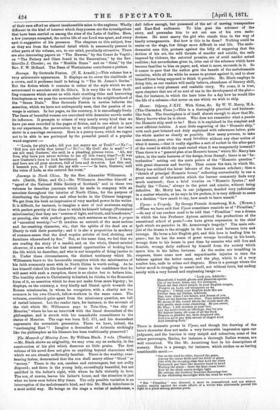The Monarch of Mincing Lane. By William Black. 3 vols.
(Tinsley.) —Mr. Black shows an originality, we may even say an audacity, in the construction of his plot which deserves no little praise. The first volume of his novel does not give us anything beyond characters with which we are already sufficiently familiar. There is the wealthy, over- bearing father, determined that the son shall marry either "blood " or "money." There is the son, careless and extravagant, but not evilly disposed; and there is the young lady, exceedingly beautiful, but not qualified in the father's sight, with whom he falls violently in love. The son, of course, leaves his father's house, and the situation is just what we have seen before fifty times. The only possible variation is an interruption of the melodramatic kind, and this Mr. Black introduces in a most artful way. He brings on the stage a writer of melodramas, a
dull fellow enough, but possessed of the art of moving transpontine and East-End audiences. To him goes the schemer of the story, and persuades him to act out one of his own melo- dramas. He must marry the girl who stands thus in the way of family arrangements. But how is this to be done? Nothing could be easier on the stage, few things more difficult in real life. The melo- dramatist sees this, protests against the folly of supposing that the devices of his art, the wild threats of murder and suicide, the oath imposed by violence, the extorted promise, are of avail amidst actual realities ; but nevertheless gives in, tries one of the schemes which have become familiar to him on paper, and, what is more, succeeds in it. So it comes to pass that the author gets the benefit of the melodramatic variation, while all the while he seems to protest against it, and to clear himself from being supposed to think it possible. Mr. Black employs in doing this, as our readers will easily believe, abundance of literary skill, and makes a very pleasant and readable story. We come, it is true, upon chapters that are of no sort of use in the development of the plot— that, for instance, in which the hero tries for a day how he would like the life of a cabman—but never on one which we wish to skip.


































 Previous page
Previous page